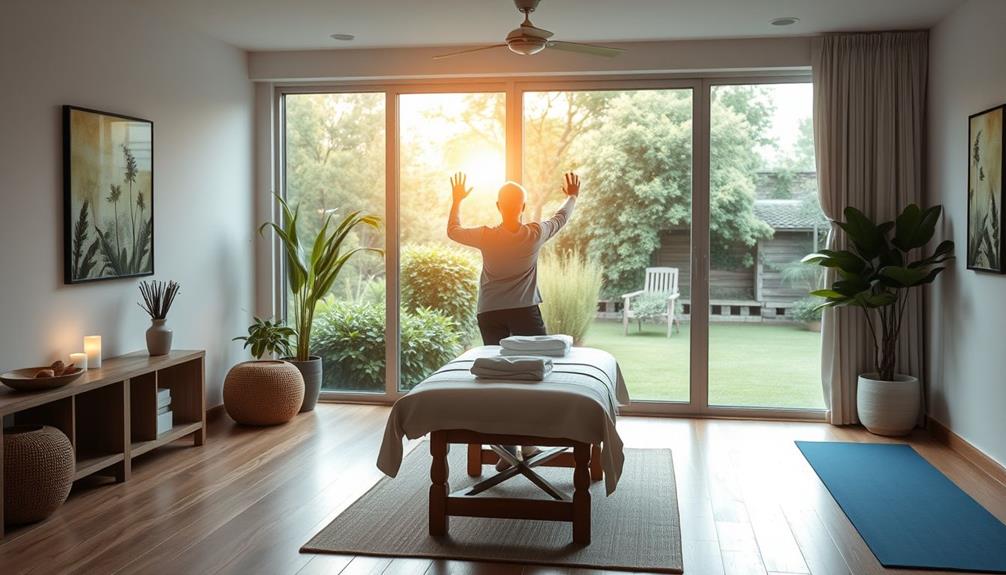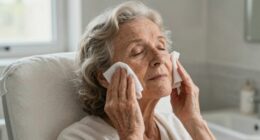If you are looking into alternative therapies for Parkinson’s disease, you may want to consider options such as Tai Chi and yoga, as they have been shown to improve balance, mobility, and overall well-being. Some patients also find benefits in expressive therapies like music and dance to boost mood and social interactions. While certain natural products show promise, their clinical advantages are still limited and they may have interactions with medications, so it’s important to consult with your healthcare provider first. It is important to note that no alternative therapy by itself can alter the progression of the disease. Combining these therapies with traditional care may provide the best outcomes, and there is still much to learn about their effectiveness.
Key Takeaways
- Tai Chi and yoga significantly improve balance, mobility, and quality of life for individuals with Parkinson's, supporting both physical and emotional well-being.
- Natural products like Vitamin E and Coenzyme Q10 show limited benefits, and herbal remedies require caution due to potential interactions with medications.
- Expressive therapies, such as music and dance, enhance mood and social interactions, positively impacting cognitive and emotional functions in Parkinson's patients.
- Consulting healthcare providers before starting alternative therapies is crucial to ensure safety and avoid unpredictable interactions with conventional treatments.
- High-quality randomized controlled trials are needed to evaluate the effectiveness of various complementary and alternative medicine modalities in managing Parkinson's symptoms.
Understanding Parkinson's Disease

Parkinson's Disease (PD) is a challenging condition that affects millions of people worldwide, primarily targeting movement control. This progressive neurodegenerative disorder leads to symptoms like tremors, stiffness, and balance issues, which can greatly impact your daily life.
If you're over 60, you have about a 1% chance of developing Parkinson's, while some regions report lower prevalence rates. It's crucial to evaluate a holistic approach to treatment, which may include natural remedies alongside conventional medications.
Diagnosing PD isn't straightforward; neurologists rely on your medical history and observable symptoms, as there's no definitive test for it. However, a DAT scan may help confirm their suspicions. The primary focus of treatment is symptom management, with carbidopa-levodopa being the most effective medication to boost dopamine levels in your brain.
In addition to medication, various therapies can enhance your health and quality of life. Research shows that non-pharmacological approaches, including exercise and complementary therapies, can be beneficial when integrated with conventional treatments.
Staying active not only helps manage symptoms but can also improve your overall well-being. Understanding Parkinson's and its symptoms is the first step toward finding the right combination of therapies to maintain your movement and enjoy a better quality of life.
Overview of Alternative Therapies

Alternative therapies refer to treatments that complement traditional medicine, focusing on holistic wellness rather than just managing symptoms.
You might notice that these therapies are quite popular among Parkinson's patients, with usage rates varying considerably across cultures.
Understanding their definitions and popularity can help you explore how they fit into your overall treatment plan.
Definition of Alternative Therapies
In recent years, many individuals have turned to alternative therapies as complementary approaches to enhance their well-being alongside conventional medical treatments.
Alternative therapies refer to non-mainstream practices that aim to improve your quality of life and manage symptoms, particularly for those with Parkinson's disease. These therapies include acupuncture, massage, yoga, and herbal remedies, all focusing on a holistic approach to wellness and empowering you as a patient.
Additionally, some people explore the benefits of vital oils for symptom relief, which may offer natural support alongside traditional treatments.
While the integration of alternative therapies into your treatment plan is becoming more common, it's important to note that evidence supporting their efficacy in altering disease progression is limited.
Many patients report positive experiences based on anecdotal evidence rather than robust clinical trials. However, you might find common benefits from these therapies, such as stress reduction, enhanced mobility, pain management, and improved sleep patterns.
Before you begin any new alternative therapies, consulting with your healthcare provider is significant to guarantee safety and compatibility with your existing treatments.
This way, you can effectively combine complementary medicine with conventional medicine to better manage your Parkinson's symptoms and overall health.
Popularity Among Patients
Why are so many patients turning to complementary and alternative medicine (CAM) for their Parkinson's disease management? Nearly 40% of patients in the U.S. explore these options, with the number soaring to 76% in Korea.
This shift is largely due to a desire for individualized and holistic approaches, as traditional treatments often focus mainly on medications. Many patients also find that integrating elements like music therapy integration can enhance emotional well-being and reduce stress, further boosting their overall quality of life.
Here are some reasons why CAM is gaining traction among patients:
- Stress Reduction: Many find that alternative therapies help alleviate stress, which can exacerbate symptoms.
- Improved Mobility: Movement therapies, like yoga and tai chi, have been reported to enhance mobility and reduce disability.
- Pain Management: Patients frequently seek out complementary therapies to manage chronic pain associated with Parkinson's disease.
- Enhanced Mental Health: Engaging in these therapies can boost overall well-being and mental health.
As the integration of CAM into treatment plans increases, both patients and healthcare providers are recognizing the potential benefits of combining traditional and alternative therapies.
This approach can greatly enhance your quality of life, making it an appealing option for many living with Parkinson's disease. By incorporating various strategies focused on symptom management and daily living adjustments, individuals can maintain greater independence and reduce the impact of the disease on their routines. Additionally, advances in assistive tools for Parkinson’s patients, such as adaptive utensils and walking aids, can further support mobility and fine motor control. These resources enable patients to perform daily tasks more easily, improving both their physical well-being and emotional outlook.
Evidence Supporting Mind-Body Practices

When you explore mind-body practices for Parkinson's, you'll find that Tai Chi offers notable benefits, particularly in improving balance and reducing fall risks.
This aligns with the principles of nurturing an imaginative mindset, which can enhance your approach to health and well-being.
While the evidence for yoga's effectiveness is less robust, it still holds promise for enhancing overall well-being.
Understanding these practices can help you create a more thorough treatment approach.
Benefits of Tai Chi
Tai Chi offers a compelling avenue for enhancing the well-being of individuals with Parkinson's Disease (PD). This ancient practice not only focuses on movement but also embodies principles that can greatly benefit people dealing with movement disorders.
Research shows that Tai Chi can:
- Improve postural stability and reduce falls
- Enhance overall quality of life for those with moderate PD
- Foster adherence to treatment regimens
- Mitigate non-motor symptoms, like anxiety and depression
Incorporating gentle stretching before bedtime can also complement Tai Chi by promoting muscle relaxation and better sleep, which is essential for managing PD symptoms.
The benefits for people with PD are notable. A large trial with 195 subjects demonstrated that Tai Chi markedly improved balance and stability, even outperforming traditional resistance training. Regular practice promotes physical and mental well-being, directly contributing to improved mood.
Additionally, the holistic approach of Tai Chi aligns with Eastern medicine principles, emphasizing energy flow and balance, which can be invigorating compared to conventional Western treatment methods.
Efficacy of Yoga
Regularly practicing yoga can notably enhance the quality of life for individuals with Parkinson's Disease (PD). Adapted yoga has been shown to considerably improve mobility, balance, strength, and flexibility, directly addressing some of the challenging Parkinson's symptoms you may face.
As a complementary therapy, yoga not only targets physical aspects but also bolsters mental well-being, leading to better mood and improved sleep quality. Additionally, engaging in holistic practices such as yoga can help manage stress levels, which is vital since regular cranberry juice consumption may also play a role in overall health.
Incorporating breathing techniques into your yoga practice can further support your mental health, providing tools to manage anxiety and stress related to Parkinson's. Many who've participated in yoga classes designed specifically for those with movement disorders have reported a notable enhancement in their overall quality of life, especially if they've moderate Parkinson's.
While the benefits of yoga are promising, it's important to note that further rigorous clinical trials are needed to fully establish its efficacy in managing Parkinson's disease.
Nonetheless, if you're looking for a holistic approach to improve your physical and mental health, integrating yoga into your routine could be a beneficial step.
Role of Natural Products

Natural products have gained attention for their potential role in managing Parkinson's Disease, particularly in addressing oxidative stress and mitochondrial function. The exploration of these alternatives is part of a broader understanding of how curiosity and happiness can influence health outcomes.
While some natural products, like Vitamin E, Coenzyme Q10, and Creatine, have been investigated, clinical trials show limited benefits in delaying disability or improving motor function.
Consider the following natural options:
- Ginseng and Ginkgo Biloba: Animal studies suggest neuroprotective effects, but human trials are lacking.
- Mucuna Pruriens: This Ayurvedic remedy contains natural levodopa, showing anecdotal benefits, though it needs more rigorous testing.
- Antioxidants: Emphasized in Eastern medicine for balancing health, but evidence in human trials remains insufficient.
- Herbal remedies: Exercise caution due to variability in quality and efficacy; consult healthcare providers for guidance.
While these natural products may hold promise, it's crucial to approach them as part of a broader alternative medicine strategy.
Always seek reliable health information and engage in thorough discussions with your healthcare team to determine the best approach for your Parkinson's management. Balancing hope with evidence is key to making informed decisions about integrating these therapies into your care plan.
Benefits of Expressive Therapies

Exploring various treatment options for Parkinson's isn't limited to natural products; expressive therapies are gaining recognition for their positive impact as well. These therapies, such as music therapy and dance, can complement your conventional treatments by promoting mobilization and enhancing cognitive, emotional, and social functions.
Engaging with music can also enhance creativity and inspire new ways to express feelings, which can be particularly beneficial in music production essentials for those interested in exploring sound and rhythm.
You might find that music therapy specifically helps improve mood and fosters social interactions, which is essential for combating the isolation that often accompanies Parkinson's. Engaging in expressive therapies can also reduce anxiety, contributing to a better quality of life.
Not only do these activities address motor symptoms, but they also target non-motor challenges you may face.
Dance, as an expressive therapy, shows great promise in greatly improving balance and mobility. While the effectiveness of these therapies can vary from person to person, they're increasingly recognized as valuable components of a holistic treatment approach.
Limitations of Herbal Remedies

While herbal remedies may seem appealing for managing Parkinson's symptoms, their limitations can greatly impact their effectiveness. Many herbal medicines lack the rigorous clinical trials that validate their benefits, often relying solely on anecdotal support.
Additionally, just like with other pets, proper care and understanding of their needs are essential for positive outcomes, as seen in the hamster care essentials.
Here are some key concerns you should consider:
- Lack of Standardization: Products like Mucuna Pruriens, a natural source of levodopa, often lack standardization, raising questions about their reliability.
- Unsubstantiated Claims: Popular herbal treatments, such as ginseng and Ginkgo Biloba, may show potential neuroprotective effects in animal studies, but human trials are lacking.
- Adverse Interactions: Combining herbal supplements with prescribed medications can lead to unpredictable reactions, making caution important.
- Absence of Regulatory Oversight: Without regulatory oversight, the quality and concentration of active ingredients in herbal products can vary widely, complicating their use as consistent therapies.
Considering these limitations, it's important to approach herbal remedies with caution. They mightn't provide the reliable relief you seek, and understanding their potential pitfalls can help you make more informed decisions about your treatment options.
Safety Considerations

When considering alternative therapies for Parkinson's, it's important to prioritize safety. Before diving into any complementary and alternative medicine, consult your healthcare provider. They can assess potential interactions between new therapies and your current medications, especially since some herbal remedies can cause unpredictable reactions.
Here's a quick overview of safety considerations regarding alternative therapies:
| Therapy Type | Safety Level | Monitoring Needs |
|---|---|---|
| Herbal Remedies | Variable | High; watch for adverse effects |
| Tai Chi | Generally Safe | Moderate; individual responses vary |
| Massage Therapy | Generally Safe | Low; monitor comfort levels |
| Acupuncture | High Quality | Moderate; verify licensed practitioners |
Studies are needed to validate the efficacy of many alternative therapies. It's important to choose those supported by rigorous clinical trials, as anecdotal reports often lack scientific backing. Always keep your medical history in mind and engage in monitoring for adverse effects when trying new therapies. Prioritizing high-quality options will help you navigate the complexities of managing Parkinson's safely.
Integrating Therapies With Conventional Care

Integrating alternative therapies with conventional care can greatly enhance your overall management of Parkinson's disease. Many people with Parkinson's are turning to complementary therapies to improve their quality of life. Research shows that mind-body interventions, such as Tai Chi and dance, can reduce disability and improve adherence to treatment when combined with traditional medical approaches.
Additionally, exploring uplifting music, like Blue Skies and Lemonade, can evoke feelings of joy and nostalgia, contributing to emotional well-being.
Consider these benefits of integration:
- Enhanced symptom relief through complementary therapies like massage and acupuncture.
- Improved physical therapy outcomes with mind-body practices.
- Increased support and motivation from joining support groups focused on holistic care.
- Evidence-based practices that encourage a thorough treatment plan.
While some complementary therapies show promise, more rigorous controlled trials are needed to establish their efficacy and safety in conjunction with conventional treatments.
Eastern medicine's holistic approach, which emphasizes balance and energy flow, contrasts with Western practices but underlines the importance of integrating these therapies for better overall outcomes.
Future Research Directions

Future research in Parkinson's disease (PD) must prioritize high-quality randomized controlled trials (RCTs) to determine the effectiveness of various complementary and alternative medicine (CAM) modalities. It's essential to address existing gaps in evidence, especially regarding the long-term outcomes of mind-body interventions like Tai Chi and Qigong. Current findings don't sufficiently support their sustained benefits, which is why more rigorous studies are needed.
Additionally, acupuncture shows inconsistencies in data, highlighting the necessity for further clinical investigations that validate its effectiveness in managing PD symptoms. Researchers should also explore the neuroprotective effects of natural products such as Ginseng and Ginkgo Biloba, as their potential remains largely unexplored in human patients.
Finally, future studies should focus on how to integrate these complementary therapies into thorough treatment plans that address both motor and non-motor symptoms of PD.
| CAM Modalities | Key Research Areas | Expected Outcomes |
|---|---|---|
| Tai Chi | Long-term benefits | Improved balance and mobility |
| Acupuncture | Efficacy for PD symptoms | Symptom alleviation |
| Ginseng & Ginkgo Biloba | Neuroprotective effects | Slowed disease progression |
Frequently Asked Questions
What Are the Unconventional Treatments for Parkinson's Disease?
Unconventional treatments for Parkinson's disease include mind-body practices like Tai Chi and yoga, herbal remedies such as Mucuna Pruriens, acupuncture for pain relief, and various vitamins or supplements, though their effectiveness varies and needs careful consideration.
How to Holistically Treat Parkinson's Disease?
To holistically treat Parkinson's, you should explore mind-body practices like Tai Chi and yoga, consult healthcare providers for tailored therapies, and incorporate lifestyle changes such as regular exercise and nutritious eating to enhance overall well-being.
What Is the Most Promising Treatment for Parkinson's?
When you seek the most promising treatment for Parkinson's, consider a tapestry woven with movement, like Tai Chi. It enhances balance and minimizes falls, creating a solid foundation for your holistic journey toward wellness.
What Is the New Treatment for Parkinson's in 2024?
In 2024, you're seeing promising advancements in Parkinson's treatment, like personalized medicine tailored to your genetics, enhanced DBS techniques, and innovative pharmacological options that aim to improve symptom relief and minimize side effects effectively.
Conclusion
In exploring alternative therapies for Parkinson's, you're traversing a complex landscape. While some approaches, like mind-body practices and expressive therapies, can enhance your quality of life, others, particularly herbal remedies, may not hold up under scrutiny. Think of your journey as weaving a tapestry—each thread represents a different therapy. By integrating these threads with conventional care, you can create a stronger, more resilient fabric that supports your well-being. Stay informed and proactive as you chart your path forward.









